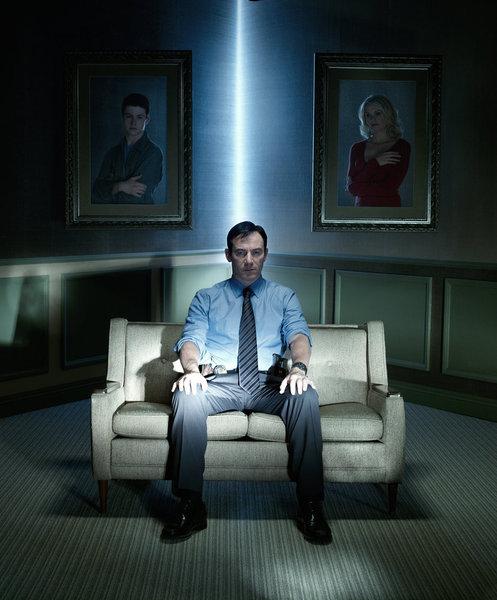TVWW readers have shared with us their disappointment over the cancellation of NBC's Awake. Contributor Eric Gould has been monitoring the series' ending, and previously reported on the show's cancellation and penultimate epsiode. We invite you to leave your own thoughts and interpretations about the series finale in the comments section below.
The success of last night's Awake series finale depended on how you feel about endings: Do you prefer stories that spell it all out and close the book, or ones that finish with ambiguity and leave the door open just a little?
Spoiler alert: If you haven't seen the series finale of Awake, stop here — we're going into the nitty-gritty details of last night's season and series finale episode.
For a series that thrived on the ambiguity of Detective Michael Britten's (Jason Isaacs) predicament — was he really in two worlds, between them, or was there something else going on? — one could say it ended a little too neatly. Or did it?
Some viewers will walk away believing that Britten was simply asleep the entire time. But there were also subtle dialogue hints that may have disproved that reality had the show continued for another season. It depends on the ending you wanted to take away, and unexpectedly gave the show's small but enthusiastic audience a few different ways to interpret the series.

Low ratings plagued the show, and two weeks ago, NBC cancelled it. Producer Kyle Killen said in a pre-finale interview with Entertainment Weekly that the show's ending had been completed well in advance of the show's cancellation and had not been re-edited for last night's broadcast.
It seems as though in the green world, where his son is alive, Britten had solved the conspiracy enacted by his own superiors that had caused the auto accident, and with that revelation the red world began to dissolve for him.
In the episode, entitled "Turtles All the Way Down" (perhaps meaning shells within shells) there's a key moment when Britten discusses the aftermath with his green-time therapist Dr. Evans (Cherry Jones). During that pivotal visit, Britten questions whether both worlds might be a dream within another dream. The door to the office then opens, and leads into his bedroom. Britten then enters into a color-corrected world, not red-tinged, or green. From there he walks into the kitche where both his wife and son remark about how long he had been sleeping.

It wasn't a literary masterstroke, but perhaps it was the best possible outcome — one that perhaps didn't give all the answers, but gave some closure to a show that took creative risks. Awake was at its best a metaphor for our own waking daydreams and inner dialogue, for those moments when we ponder lives un-lived.
Perhaps Britten's multiple worlds should be assumed to continue, since that's how we go on ourselves. What are scripted shows, anyway, but a world created in someone's else's imagination? In that sense, we're simply going along for the ride, anyway, so why should Britten's inner escape be a letdown?
It's also another example (Rubicon comes to mind) of a show that set a novel-like tone and world of quietude, both of which are antithetical to most scripted dramas that move quickly to keep the momentum high, and presumably, maintain viewers interest. That's obviously a consideration when discussing both Rubicon and now, Awake, neither of which reached a second season.
Another consideration is that perhaps both shows were perfect for one season — becoming maxi-series of sorts. Awake's idea of a man with two equally real waking lives, and the mystery behind it, perhaps could not have held interest for multiple seasons. It did not have the ensemble scenario of a enigmatic journey like Lost where the story could branch off into many storylines.
You could argue that we should be very satisfied with Awake's single-subject, one-season mystery. AMC's The Killing has gone off the rails in its second season, with viewers deserting the show thanks, in part, to the major red herring introduced to sustain the Rosie Larson murder mystery. The Killing is obviously not an idea worthy of multiple seasons. Would Detective Britten's dilemma have gone stale in season two, too?
Awake was a bold journey into an unusual place. The world that Killen created was unique, and that cannot be said of many shows.
But now it's time to put Awake to bed.